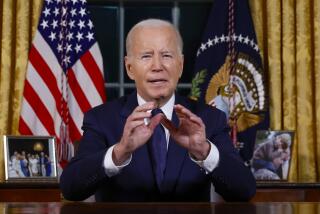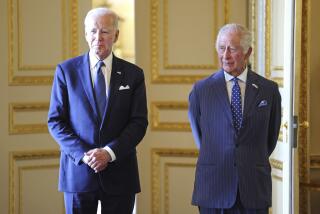War Aside, Bush and Blair Diverge on Key Issues
- Share via
WASHINGTON — Although President Bush and British Prime Minister Tony Blair remain indivisible in their commitment to deposing Saddam Hussein, broader differences in their views on how to organize the world against other threats may grow slightly more visible during Blair’s visit with Bush that ends today.
On a range of international issues beyond the war in Iraq -- from global warming to the role of the United Nations -- Blair is much closer to U.S. Democrats who argue that the United States needs to increase cooperation with other nations.
And, though Blair seeks to minimize the differences, his underlying view promises steady strain with Bush, who has been much more focused on unfettering U.S. power from the restraints of international alliances and institutions.
“The constraints of diplomacy ... have meant that Blair has never been ready to stand up and declare his opposition to the ideological orientation or instinct of the Bush administration,” said Tom Bentley, the director of Demos, a London- based think tank close to Blair’s Labor Party. “But there’s no doubt that his vision of a more safe and ordered world includes elements of social justice and internationalism that are probably foreign to the way that Bush and several of his key advisors think.”
During Blair’s talks with Bush, which began Wednesday night at Camp David, the most apparent contrasts in emphasis may be on the postwar governance of Iraq and the urgency of advancing peace talks between Israel and the Palestinians.
Over the last few weeks, the administration has developed plans to centralize U.S. control of a postwar Iraq. It has designated a retired Army general, Jay Garner, to initially run the country under the direction of Gen. Tommy Franks, who is directing the war. It also has begun to sign contracts with U.S. companies to provide key reconstruction services and suggested that it would prefer to limit the U.N.’s role to humanitarian aid.
“We didn’t take on this huge burden with our coalition partners not to have significant, dominating control over how it unfolds in the future,” Secretary of State Colin L. Powell said Wednesday.
Meeting with reporters Tuesday, Blair endorsed a much wider role for the U.N. “There is no question of the U.N. role being reserved simply for the humanitarian situation,” he said. “It is important that whatever administration takes over in Iraq ... has the authority of the U.N. behind it.”
Blair argued that Bush broadly shared his commitment to U.N. involvement. And Wednesday he told reporters it would be “premature” to try to resolve the differences now. But he may be signaling his preferences by visiting U.N. Secretary-General Kofi Annan today on his way back to London.
Blair also has placed greater emphasis than Bush on pressuring Israel and the Palestinians into progress toward a peace agreement. Over the last several weeks, Blair has said that reviving the Middle East peace process “remains essential to any understanding” with the broader Arab and Muslim world. Most Bush administration officials believe that it is more important to send a message to Arab regimes by deposing Hussein and then building a democracy to replace him.
Blair indicated Wednesday that during this trip he isn’t likely to publicly stress these -- or other -- disagreements with Bush. White House officials are equally optimistic that the two will avoid public disagreements, even if they can’t find common ground on the U.N.’s postwar role in Iraq.
“You can’t have your two closest allies in a war having a catfight in public. But they won’t even have one in private,” said one senior White House aide. “They like each other, they respect each other, and they work their differences out pretty well ... and I don’t see any reason they won’t here.”
Yet, in his public statements, Blair has made it clear that his priorities in international affairs -- even his basic framework for organizing relations among the world’s countries -- often depart starkly from Bush’s.
Those differences reflect an underlying political distance that is even greater on domestic than international issues: Blair leads a left-of-center party that takes positions broadly similar to former President Clinton’s “New Democratic” synthesis, while Bush has pursued an aggressive conservative agenda at home and abroad.
Blair and Bush diverge on the necessity of global cooperation in meeting environmental, economic and security challenges, and the proper role for the United States within such an international system.
Much like Democratic presidential contenders Sens. John F. Kerry of Massachusetts and Joseph I. Lieberman of Connecticut, Blair argues that the best way to confront such issues -- and for the U.S. to minimize resentment of its preponderant power -- is to bind the nation to the world through strengthened alliances and invigorated international institutions.
“The countries and the people of the world today are more interdependent than ever,” Blair said last year. “That calls for an integrated approach.”
Bush, by contrast, has rejected international treaties on issues from global warming to a war crime tribunal and placed much greater priority on maximizing U.S. freedom of action.
Those differences were apparent during the long struggle at the U.N. over Iraq; Blair always appeared more willing than Bush to make concessions, and to extend the negotiations, in the hope of winning broader international support for military action.
On other international issues beyond Iraq and the Middle East, the same instinct divides Blair and Bush. Bush has renounced the Kyoto treaty to reduce emissions of the gases associated with global warming; in late February, Blair not only reaffirmed his support for the pact but called it “not radical enough” and pledged to achieve massive additional reductions.
More to Read
Sign up for Essential California
The most important California stories and recommendations in your inbox every morning.
You may occasionally receive promotional content from the Los Angeles Times.













